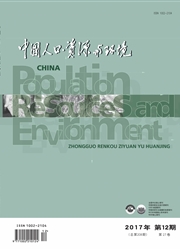

 中文摘要:
中文摘要:
资源短缺、环境容量有限已经成为我国国情新的基本特征。而我国经济总量将继续扩大。资源环境压力将持续加大。开征环境税被认为是减少污染排放和促进发展方式转型的有效经济政策之一。本文利用GREAT—E模型分析环境税改革后不同税率水平对宏观经济、污染减排、收入水平、产业结构、贸易结构和要素需求的影响,为制定相关的环境税制度和政策提供决策支持依据。模拟结果表明。征收环境税对中国宏观经济的影响非常有限,GDP的下降在可承受的范围之内;相对而言,征收环境税对污染物的减排作用远大于对经济发展的抑制作用。较高税率的环境税能够较大幅度的减少污染物的排放。模拟结果表明。征收环境税有利于产业结构优化调整,重污染行业受到抑制.而清洁产业反而加快发展。征收环境税会抑制重污染产品出口,提升清洁行业的出口竞争力。降低贸易顺差对我国环境的影响。这主要是因为重污染行业因为成本的增加.减少了生产规模.释放出的资本和劳动力等要素资源被转移到了清洁产业。从而促进了这些产业的发展。征收环境税在增加政府收入的同时会对居民福利产生一定的负面影响,但是考虑到污染减排能够带来环境质量的改善.进而产生正面的居民福利效应和社会效应,环境税征收产生的社会负面影响实际上要小于模拟结果。为了促进环境成本内部化,建议提高污染税/费标准。由于现有排污收费标准偏低,远低予污染治理成本,很多企业宁愿缴纳排污费也不愿意治理污染。因此未来开征环境税应将税率应至少与治理成本相当,通过将环境成本完全内部化。达到促进污染者减少污染排放的目标。另一方面。建议政府通过减免所得税或者向弱势群体提供补贴等方式减少环境税征收的负面影响。
 英文摘要:
英文摘要:
Resources shortage and limited environmental capacity have already been the new basic characters of China' s national conditions. What' s more, the economy in China will continually develop and environmental pressure will be getting higher. Collecting environmental taxes is considered as one of the effective economic policies for reducing pollution emissions and promoting development transformation. To supply supporting evidences for relative policy making, this article uses GREAT-E model to analyze the influences of different tax rates on macro economy, pollution reduction, income level, industrial structure, trade structure and factor demand after reform of environmental taxes. The results of simulation show that collecting environmental taxes has a limited effect on China' s macro economy and the decline of GDP is within a range that can be stood. Relatively speaking, the positive effect on pollution reduction is far beyond the inhibition effect on economic development. The results also illustrates collecting environmental taxes is good for structure adjustment, inhibition of heavy pollution industry and development of clean industry. Also, it will limit the export of heavy pollution products, boost the export competitiveness of clean products and the environmental impact of trade surplus will be reduced. Due to the increasing cost of heavy pollution industry and the reducing production scale, the releasing elements including capital and labor are transferred to clean industry, so that these industries will be vigorously developed. Collecting environmental taxes could increase government revenue while have a negative effect on residents welfare. But considering the changes of environmental quality brought by pollution reduction, as well as the positive resident welfare effect and social effect, the actual negative influence will be smaller than that in simulation result. To promote environmental cost internalization, it is suggested to increase the standard of pollution taxes/ charges. Since the current
 同期刊论文项目
同期刊论文项目
 同项目期刊论文
同项目期刊论文
 Uncertainty analysis of downscaling methods in assessing the influence of climate change on hydrolog
Uncertainty analysis of downscaling methods in assessing the influence of climate change on hydrolog The impacts of climate variablity and human activities on streamflow in Bai River basin, Northern Ch
The impacts of climate variablity and human activities on streamflow in Bai River basin, Northern Ch Development of an AutoWEP distributed hydrological model and its application to the upstream catchme
Development of an AutoWEP distributed hydrological model and its application to the upstream catchme The streamflow estimation using the Xinanjiang rainfall runoff model and dual state-parameter estima
The streamflow estimation using the Xinanjiang rainfall runoff model and dual state-parameter estima Integrated simulation of the dualistic water cycle and its associated processes in the Haihe River B
Integrated simulation of the dualistic water cycle and its associated processes in the Haihe River B Estimating the contribution of groundwater to rootzone soil moisture for soybeans grown on the Huaib
Estimating the contribution of groundwater to rootzone soil moisture for soybeans grown on the Huaib An Analysis of Water Consumption and Pollution with the Input-Output Model in the Haihe River Basin,
An Analysis of Water Consumption and Pollution with the Input-Output Model in the Haihe River Basin, Variability, change and prediction of hydro-climatic elements in the Hai River basin, China. Hydro-c
Variability, change and prediction of hydro-climatic elements in the Hai River basin, China. Hydro-c The Effect of a Gravel‐Sand Mulch on Soil Water and Temperature in the Semiarid Loess Region of Nort
The Effect of a Gravel‐Sand Mulch on Soil Water and Temperature in the Semiarid Loess Region of Nort 期刊信息
期刊信息
